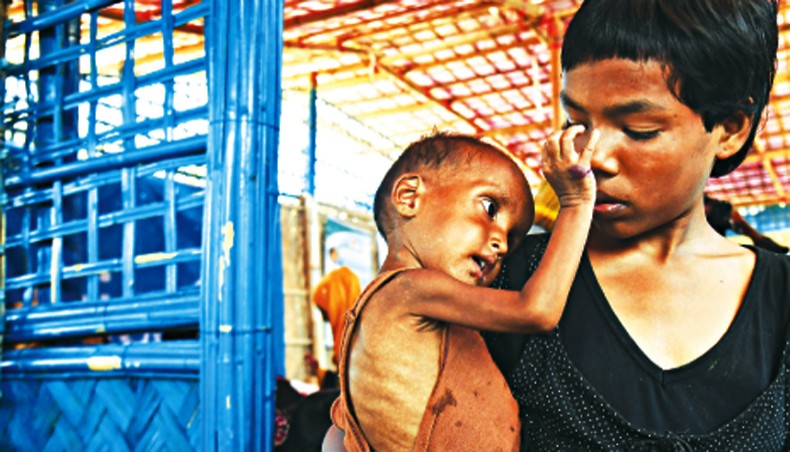ROHINGYA CRISIS New arrivals crowd border
Several thousand new Rohingyas reached Bangladesh border with Myanmar early Monday as the ethnic minority people have continued to flee violence in their villages in Rakhine State of the country.
About 3,000 Rohingyas have arrived overnight and in the early hours, UNHCR emergency response coordinator Joung-ah Ghedini said in a recorded statement from Cox’s Bazar on Monday.
She said they were walking for days. Many of them were hiding for up to two weeks in the forest while many of them crossed rivers and paddy fields escaping the violence that they faced in their villages.
Many of them saw their homes being burnt and they lost relatives along the way, the UNHCR official said, adding the new arrivals ‘are desperate for help’.
Some 730 more Rohingyas entered Bangladesh crossing the River Naf near Shah Porir Dwip on early Monday, according Md Dilwar Hossen, senior fishery officer, Teknaf and team leader of Rohingya relief distribution monitoring committee in Teknaf, Our
Correspondent in Cox’s Bazar reported.
They said they were coming from Buthidaung township of Rakhine and they were starving.
The new arrivals were sent to Ledha and other makeshift camps with relief materials including dry foods, water, medicine, plastic sheet to build shade.
Md Rezaul Karim, camp in-charge at Kutupalang under Ukhiya police station, said some 10,000 Rohingyas would be shifted soon to Kutupalang and Balukhali extension camps for shortage of space at government allotted 3,000 acres of forest land.
Chittagong divisional commissioner Mohammad Abdul Mannan said in a meeting on Sunday that more lands might be required for accommodating thousands of new arrivals.
International Organisation for Migration said in a report, released on Sunday night, that nutritional status of under-5 Rohingya children have drastically deteriorated compared to the last year, according to United News of Bangladesh.
‘This situation is very worrying,’ the IOM said.
The Social Services Division has identified and registered 22,484 unaccompanied and separated children as of October 28, according to the Inter-Sector Coordination Group that operates under the strategic guidance provided by a Policy Group, which includes UN, INGOs and donors at Dhaka level.
Over 6,09,000 minority Rohingyas, mostly women, children and aged people, entered Bangladesh fleeing unbridled murder, arson and rape during ‘security operations’ by Myanmar military in Rakhine, what the United Nations denounced as ethnic cleansing, between August 25 and November 5.
The ongoing influx took the total number of undocumented Myanmar nationals and registered refugees in Bangladesh to over 10,28,000 till Sunday, according to estimates of UN agencies.
As of November 4, the Bangladesh Immigration and Passports Department registered 405,700 people using biometric registration.
Lack of space continues to be an obstacle to the establishment of service facilities, including child-friendly spaces and safe spaces for women and other vulnerable Rohingyas, the report adds.
It affects the access of refugees to necessary services, including identifying private, safe service points for protection case management and for psychosocial support services for GBV (gender-based violence) cases.
With increasing new arrivals, comprehensive, protection-sensitive reception systems need further development to ensure proper reception of all refugees, including those with vulnerabilities and specific needs.
There is a lack of capacity of protection agencies and service providers to address protection risks and needs in host communities, villages and informal settlements, says the report.
Violence in Rakhine State that began on August 25 last has driven the Rohingyas across the border into Cox’s Bazar.
People who arrived in Bangladesh since then came with very few possessions.
They have used the majority of their savings on transportation and construction of shelter, often with bamboo and thin plastic sheet.
All of them are now reliant on humanitarian assistance for food, and other lifesaving needs.
The government continues to urge the United Nations to create pressure on the Myanmar government to take back Rohingyas back to their home in Rakhine State.
‘Create more pressure on Myanmar government so that they take the Rohingyas back to their own country within the shortest possible time,’ health and family welfare minister Mohammed Nasim told visiting UN under secretary general Pramilla Patten in a meeting at his office in Dhaka on Monday.
News Courtesy: www.newagebd.net











